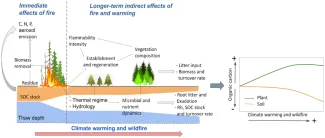Model simulations show that it may take several centuries of warming and wildfire increases for Alaska to become a net source of CO2 to the atmosphere.
Arctic and boreal permafrost soil organic carbon (SOC) decomposition has been slower than carbon inputs from plant growth since the last glaciation. Anthropogenic climate warming threatens this historical trend by accelerating SOC decomposition and altering wildfire regimes. Currently, large differences exist between observationally derived and numerical model estimates of future high-latitude carbon stocks. It is clear that climate warming and wildfires can cause rapid high-latitude soil carbon losses, but it is unclear how and over what time frame increases in vegetation growth may offset these losses. To address this uncertainty, the team modeled observed plant biomass and carbon emissions from wildfires in Alaskan ecosystems under current climate conditions. In projections to 2300, warming and increased atmospheric CO2 resulted in plant biomass gains and higher litterfall; however, increased carbon losses from wildfire combustion and rapid SOC decomposition caused by increased temperature, deciduous litter production, root exudation, and active layer depth resulted in about 4.4 PgC of SOC losses from Alaska. These SOC losses offset plant carbon gains, causing the ecosystem to transition to a net carbon source after approximately two centuries. These results show that over that time scale, projected wildfires and their effects on plant and soil carbon may accelerate high-latitude soil carbon losses, resulting in positive feedback to climate change.
For more information, please contact:
Zelalem Mekonnen
zmekonnen@lbl.gov

